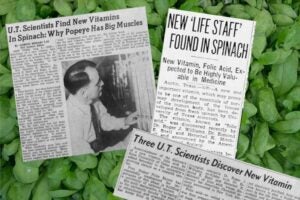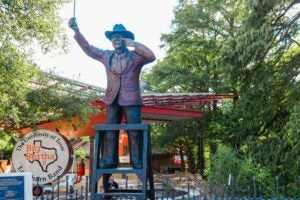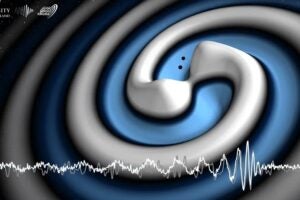AUSTIN, Texas—For his half century of pioneering work in basic research, The Welch Foundation today named Allen J. Bard at The University of Texas at Austin the 2004 recipient of the international Welch Award in Chemistry.

|
|
Allen J. Bard
|
|
Photo: Marsha Miller |
The Welch Foundation, one of the nation’s oldest and largest sources ofprivate funding for basic research in chemistry, will present this $300,000 prizeto Dr. Bard in October. The foundation has supported Dr. Bard’s researchsince 1961, endowing the Norman Hackerman-Welch Regents Chair in Chemistry heholds.
Sensitive clinical tests, self-cleaning glass, pollutants decomposed by light, potential high density computer memory from photocells—all these seemingly futuristic applications stem in part from Bard’s fundamental research and fascination with using electrochemistry and light to better understand complex chemical systems.
“One of Dr. Bard’s key contributions has been the creation of very sensitive tools and techniques that are now broadly used in both basic and applied science,” said Richard J. V. Johnson, chairman of The Welch Foundation. “His goal to better understand chemical processes has led to applications that ultimately improve life, which is the very essence of the Welch Award.”
Bard became interested in electrochemistry when it was largely devoted to applications, like batteries and electroplating. He believed that electrochemical methods could also provide sensitive tools to understand chemical reactions at the molecular level. Among his most significant contributions have been the invention and development of electrogenerated chemiluminescence (ECL) methods of analysis, now the basis for immunoassays and DNA analysis; the scanning electrochemical microscope, providing high-resolution chemical imaging of surfaces and studies of reactions at nanometer dimensions; and particulate semiconductor photoelectrochemistry and its application to photodecomposition of pollutants and deposition of metals.
“Over the course of his career, Dr. Bard has achieved many notable successes across a remarkably wide range of chemistry fields,” said Norman Hackerman, professor emeritus of chemistry and biochemistry at the university and chairman of the Welch Scientific Advisory Board. “He also generously shares his knowledge and works to advance science through teaching, writing and active leadership in scientific organizations.”
“It is an honor to receive the Welch Award in Chemistry, especially since my professional career was launched in Texas,” Bard said. “I share the Foundation’s dedication to basic research in chemistry and will continue to expand upon the research findings that my group and I have explored over the years.”
Bard and his group were among the first to explore and develop a way to use electrochemistry to generate light, providing a very sensitive and selective method of analysis. Today, ECL is a technique widely used for immunoassays, such as detecting the HIV virus, and bioassays, such as DNA analysis.
In another landmark achievement, Bard and his group greatly improved scientists’ abilities to study chemical reactions on or near surfaces with the invention of the scanning electrochemical microscope. The scanning electrochemical microscope uses a small electrode and scanning probe techniques, which allow the user to glean information about the chemical activity in the object being viewed at high resolution. This widely used tool is particularly helpful in imaging and analyzing surface structures and measuring reaction rates.
Further exploring the use of electrochemistry with light, Bard studies ways both to put light into systems and to generate light from systems. From this work has sprung many interesting applications, including using light on semiconductor particles to decompose pollutants and using solid-state cells to create new light sources. From the investigation of solar cells for converting light to electricity, has come small and dense nanocells that also could house huge amounts of computer memory. He also continues to seek new and enhanced methods for probing chemical questions, with more focus on biological applications.
Bard earned his undergraduate degree in chemistry at City College of New York (1955), and his graduate (1956) and doctoral (1958) degrees at Harvard University. He joined the faculty at The University of Texas at Austin in 1958.
He is a member of the National Academy of Sciences and served as editor-in-chief of the Journal of the American Chemical Society from 1982 to 2001. He has received numerous honors, including the American Chemical Society Priestley Medal (2002), National Academy of Sciences Award in Chemical Sciences (1998), American Chemical Society Analytical Chemistry Award in Electrochemistry (1988), Luigi Galvani Medal of the Italian Chemical Society (1992), Electrochemical Society Olin Palladium Medal (1987), New York Academy of Sciences Award in Mathematics and Physical Sciences (1986), Bruno Breyer Memorial Award of the Royal Australian Chemical Institute (1984) among others.
Now celebrating its 50th anniversary, the Houston-based Welch Foundation has provided more than $517 million in support for science. In addition to the Welch Award, its endeavors are focused primarily on chemical research in Texas, including a research grant program; an annual research conference; the annual Norman Hackerman Award in Chemical Research to recognize a “rising star” young scientist in Texas; grants to chemistry departments at small and medium-sized educational institutions in the state; and funding of 42 academic chairs in chemistry. The foundation also provides support at Texas universities for a visiting lecture series by prominent chemists, a summer scholar research program for high school students, and a biennial conference for high-school chemistry and science teachers.
For more information contact: Barbra Rodriguez or Tiffany Heikkila, College of Natural Sciences, 512-232-0675.



